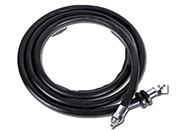Petrochemical Hose For Oil and Gas Industry Applications
2022-08-08 10:14:44
A Petrochemical Hose, a special type of industrial hose, is used to transfer petroleum products. These products include petrol, kerosene, diesel oil, heating oil, hydraulic oil, lubricating and hardening oils, emulsions, and machining oils. There are many types of petrochemicalhoses. It is important to choose the right one for your business. This article will walk you through some of the more common uses for these hoses and help you choose the right one for your needs.
Petrochemical Hose
The petrochemical industry requires a variety of hoses because they are used in the production process of plastic resins derived from petroleum. Applications include chemical transfer, steam lines, dry bulk material handling, and dock hoses. This article explores a few of these applications and how a Petrochemical Hose is used in these industries. Continue reading to learn more about Petrochemical Hose. Also, check out our other article on the different types of hoses for this industry.
Initially, a steel pipeline was used for chemical production at the EVRAZ plant in Russia. However, the aggressive mixture of sulfur dioxide and alkalis eventually wore the pipeline to a point of failure. Two separate incidents of pipeline failure caused the pumping process to halt, preventing the production of the chemicals. A flexible hose with flanged connections was installed to replace the steel pipeline. This led to significant cost savings for the company.
For the transfer of petroleum products, petrochemical hoses can be used. These products include crude oil, petroleum products, or petroleum derivatives. They can be rigid or flexible and are suitable for use in high temperatures and abusive weather conditions. Moreover, they are designed for reliable performance over a long life. These petrochemical Hoses can be used in all industries, from oil refineries to power stations. And if you're thinking about investing in a Petrochemical Hose, check out our guide to help you decide.
Petrochemical Hose Manufacturer
A Petrochemical Hose Manufacturer is a manufacturer of hoses for oil and gas industries. These hoses are used for the extraction, processing, transfer, and transfer of liquid petroleum products. These hoses are also necessary for loading and unloading oil and gas vehicles, as well as other technological processes in the industry. These hoses must be resistant to different substances, including modern fuel additives and transformer oils.
There are several types of petroleum composite hoses available on the market today. These hoses can be used in-plant or off-load petroleum products. They are usually available in lengths of 10 meters, but longer lengths can also be ordered. Petrochemical Hose Manufacturers offer a variety of end fittings, including threaded and unthread Nipples. Additionally, these hoses can also have various quick couplings.
A Petrochemical Hose Manufacturer offers custom-made products in addition to standard materials. This specialized hose manufacturer will meet the needs of any company. It is important to understand the requirements of your project. A hose should be capable of withstanding 1-1/2 times its service pressure. The jacket and reinforcement should be free of broken threads. Hoses are fragile and can crack under stress so be careful when handling them.
Petrochemical Hose Price
Petrochemical hoses are used for the transfer of petroleum-based products and fuels. These hoses come in various sizes and can be customized to the required length and diameter. These hoses can be fitted with a variety of fittings for various connections. Hose assemblies include fittings on both ends. Petrochemical hoses are ideally suited for oil-refining and oil-and-gas-exploration applications.
The industry standard RP1 petroleum line is used to transfer petroleum products from a tank truck rig, plant, or other locations. It has a diameter of one-half to four inches. It can withstand pressures up to 150 psi. It is available in different colors. It is recommended that hoses that are chemical-resistant are used for applications in firefighting or chemical processes.
NL3010 is a standard-duty petroleum hose, but is not suitable for aggressive applications. It can also withstand pressures of up to 15 bar. Its exteriorly crimped dry seal fittings are designed for resistance to aggressive media. NL3020 is a special petroleum transfer hose, which is designed for critical service. These hoses are available in a range of colors and are available in a wide range of sizes.